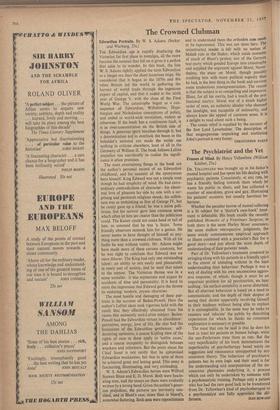The Psychiatrist and the Vet
Frames of Mind. By Henry Yellowlees. (William Kimber, 25s.) DR. YELLOWLEES was brought up in his father's mental hospital and has spent his life dealing with psychiatric patients. Consciously, at any rate, he has a friendly feeling towards them which he wants his public to share, and has collected a number of anecdotes, grave and gay, illustrating his patients' eccentric but usually harmless be- haviour.
Whether the peculiar horror of mental suffering is a fit subject for a `doctor's case-book' treat- ment is debatable. His book recalls the recently published Memoirs of a Veterinary Surgeon; in both there is the same Harley Street assurance, the same mellow retrospective judgments, the same sturdy commonsense empirical approach to illness combined with a journalist's flair for a good story—and just about the same depth of understanding of their patients' needs.
Part of Dr. Yellowlees's treatment consisted in stringing along with his patients in a friendly spirit to the extent of imitating without in the least understanding their behaviour. Perhaps it was a way of dealing with his own unconscious aggres- sive response, of which, though it must be an important problem for all psychiatrists, we hear nothing : his surface amiability is never disturbed. But all aberrant behaviour is based on a need to communicate; and the depth of their despair at seeing their doctor apparently involving himself in their madness without being able to explain it is unimaginable. In the same way he seeks to reassure and 'educate' the public by describing experiences for which he thinks no consistent explanation is necessary or possible.
The most that can be said is that he does his best to treat his patients as human beings, while the neo-Pavlovians treat them as rats. But the very superficiality of his book demonstrates the superficiality of psychotherapy based solely on suggestion and reassurance unsupported by any consistent theory. The behaviour of psychiatric patients has its own logic and their need is for the understanding and interpretation of the un- conscious phantasies underlying it, a process which can only be undertaken by someone with a psychoanalytic training. Perhaps only a patient who has had the rare good luck to be transferred from Dr. Yellowlees's kind of psychotherapist to a psychoanalyst can fully appreciate the dif-










































































 Previous page
Previous page